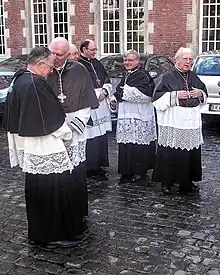rochet
See also: röchet
English
Etymology 1

A group of canons wearing white rochets under black mozzettas.
Middle English roket, rochet, from Anglo-Norman rochet, Middle French rochet, from Frankish (cf. Old English rocc (“overgarment”)).
Pronunciation
- (UK) IPA(key): /ˈɹɒtʃɪt/
Noun
rochet (plural rochets)
- A white vestment, worn by a bishop, similar to a surplice but with narrower sleeves, extending either to below the knee (in the Catholic church) or to the hem of the cassock in the Anglican church. [from 12th c.]
- 1600, Edward Fairfax, The Jerusalem Delivered of Tasso, XI, iv:
- Each priest adorn'd was in a surplice white, / The bishops don'd their albes and copes of state, // Above their rochets button'd fair before, / And mitres on their heads like crowns they wore.
- 1790, Edmund Burke, Reflections on the Revolution in France:
- They will tell you that they see no difference between an idler with a hat and national cockade, and an idler in a cowl or in a rochet.
- 1600, Edward Fairfax, The Jerusalem Delivered of Tasso, XI, iv:
- (now rare, historical) A frock or outer garment worn in the 13th and 14th centuries. [from 14th c.]
Etymology 2
From Middle English roget, from Middle French rouget.
Czech
French
Etymology 1
From Old French rochet, ultimately from Frankish *hrokk.
Etymology 2
From Frankish *rokko, perhaps under influence of Etymology 1, above.
Descendants
- → English: ratchet
Further reading
- “rochet”, in Trésor de la langue française informatisé [Digitized Treasury of the French Language], 2012.
Middle English
This article is issued from Wiktionary. The text is licensed under Creative Commons - Attribution - Sharealike. Additional terms may apply for the media files.